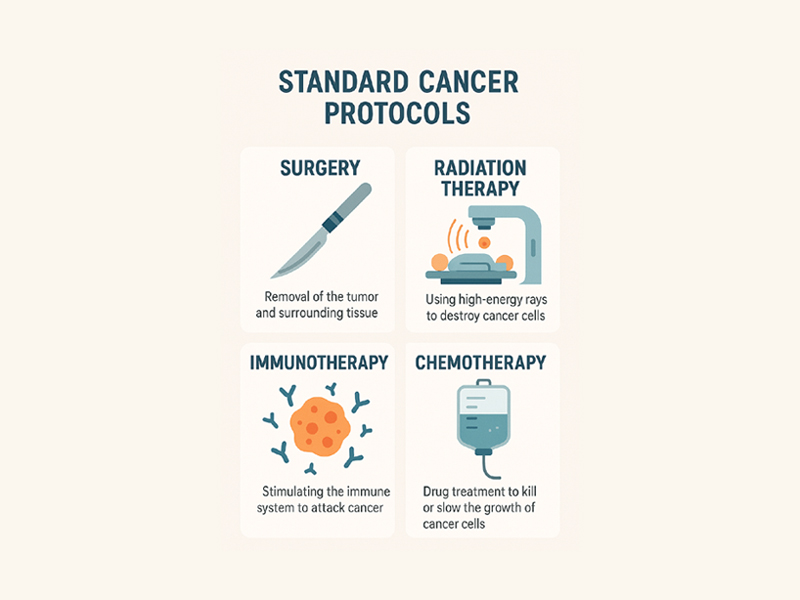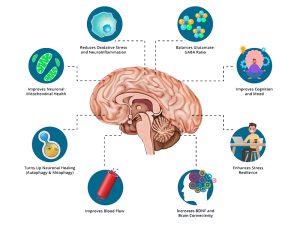By Linda Wulf — Cancer Thriver, Advocate, and Researcher
The Moment It Changed: Standard Cancer Protocols
Understanding the implications of Standard Cancer Protocols is essential for informed decision-making in cancer treatment.
It happened on a quiet hospital night in January 2024. I was sitting in my room at the Mayo Clinic, still recovering from another high-dose methotrexate infusion. The side effects were accumulating—brain fog, weakness, and immune depletion—but the unease that grew inside me wasn’t just physical. It was something deeper. Something first instinctual and then institutional.
That night, I opened my laptop and typed a question into ChatGPT: “Who writes the guidelines for central nervous system lymphoma?”
The answer came back quickly: the National Comprehensive Cancer Network (NCCN)—a non-profit alliance of elite cancer centers across the United States that produces the protocols used in nearly every major institution. The same guidelines that were directing my care.
These Standard Cancer Protocols, while systematic, may not always consider individual patient histories.
But when I visited the NCCN website that night, something unexpected appeared. At the top of the guidelines submission page, I saw the names AbbVie Medical, Genentech, and Pfizer. The wording implied that these companies weren’t just supporters but gatekeepers—positioned to influence which drugs made it into the standard of care, long after the research was done and the manufacturing complete. Moments later, the page shifted—replaced by a list of credentialed researchers from major institutions like Stanford, Harvard, and the Mayo Clinic. But that fleeting glimpse revealed a deeper truth: the protocols steering my care appeared, if only briefly, to answer to industry interests—not to independent science.1
That was the decisive moment that changed for me.
When the Disconnect Became Clear
My decision to walk away didn’t begin with ChatGPT, or NCCN, or even the protocols. It started weeks earlier, on December 5, 2023, when I first heard the phrase “inoperable but treatable.” I remember writing in my journal that day and feeling something crack: a disconnect between what I knew about nature, healing, and inflammation—and what the doctors were saying. They told me this cancer had no cause, just bad luck. But I’d lived with chronic dental infection, which was active at this time. I knew my body’s story. What they were offering wasn’t hope; it was protocol and a lifetime of medical support required to deal with the lingering side effects of the recommended treatment.
Standard Cancer Protocols often omit discussions about underlying conditions that may contribute to cancer.
That moment I realized how deeply pharmaceutical companies were tied to the very guidelines directing my care, it didn’t spark the decision. It confirmed it.
A Rare Diagnosis—and Rare Consent
My cancer—Primary Central Nervous System Lymphoma (PCNSL)—is considered rare. That label triggered a specific sequence of events: a diagnosis fast-tracked into treatment, multiple high-risk drugs, and a deeply standardized regimen. What I didn’t fully understand at the time was that many of the drugs in this protocol were either off-label or experimental.
- Temozolomide was part of my treatment. Yet it’s not FDA-approved for PCNSL. Worse, it’s known to deplete lymphocytes—the very cells I needed to heal.
- I had severe reactions to Rituximab (violent immune response), Leucovorin (poor tolerance), and Vancomycin (triggered an allergic flag).
- The NCCN guidelines I was given 12 different clinical trials recommended and had one brief phrase about healthy living.
At no point did anyone stop to ask why I had this cancer—what my body had been exposed to, whether my long-standing dental infection, systemic inflammation, or chemical sensitivities played a role. Instead, I was swept into the treatment protocol: no pause, no curiosity, and no exploration of root causes.
I felt trapped within the confines of Standard Cancer Protocols without thorough exploration of alternatives.
But here’s the thing: I now believe I may have been part of a clinical trial. No one told me that explicitly—and I don’t recall signing anything obvious—but I can’t rule it out. And that’s the deeper issue: in the world of rare disease, “informed consent” often dissolves into vague paperwork and automatic enrollment.
The Orphan Drug and Rare Disease Loophole
My diagnosis – Primary Central Nervous System Lymphoma (PCNSL), qualifies as a rare disease under the Orphan Drug Act of 1983 and the Rare Diseases Act of 2002, laws enacted to spur research and development for conditions affecting fewer than 200,000 Americans (the threshold for ‘rare’ under the ODA).
The rules surrounding Standard Cancer Protocols can create barriers to personalized care.
The intention was noble. The outcome? More slippery.
Drugs approved under these acts are often:
-
- Benefit from flexible FDA approval standards, like smaller trials or surrogate endpoints.
- Receive tax credits of up to 25% for clinical trial costs;
- Access competitive federal grants from FDA and NIH, ranging from hundreds of thousands to millions;
The benefits of Standard Cancer Protocols are often touted, but patients should be aware of the potential risks involved.
- Waive FDA user fees, saving companies millions per application;
- Gain seven years of market exclusivity for the orphan use—even for off-patent drugs.
In practice, this allows companies to profit from drugs integrated into rare disease protocols without necessarily demonstrating improved outcomes. And since guidelines like NCCN’s are developed by experts at institutions receiving funding from those same companies, the incentives form a tight circle.
According to their own 2020–2023 patient guidelines, the NCCN’s recommendations are based largely on expert opinion and trial availability—not robust long-term outcomes. Even the most recent protocols continue to suggest clinical trials and immunochemotherapy combinations while failing to acknowledge root causes or preventative strategies.
Patients need to critically assess the Standard Cancer Protocols being recommended to them.
I wasn’t just a patient. I was a participant in a commercial enterprise.
The Economics of “Standard of Care”
One look at my Mayo Clinic itemized bill told the other half of the story. The pharmaceutical reimbursement rates are staggering—Rituximab was billed at nearly $13,000 per dose. Leucovorin: over $400 per vial. Temozolomide and Vancomycin were also priced at a premium.
Understanding the cost implications of Standard Cancer Protocols can be enlightening for patients.
But it wasn’t just the cost. It was the pattern.
These were the exact drugs I reacted poorly to—triggering violent immune responses, allergic reactions, or systemic crashes. And the manufacturers? Genentech for Rituximab. Pfizer for Vancomycin and Leucovorin. Merck and generic suppliers for Temozolomide. Ironically—or perhaps not—Genentech and Pfizer were among the names that briefly appeared at the top of the NCCN guidelines page that night.
The array of drugs within Standard Cancer Protocols can vary greatly between treatment centers.
These weren’t just medications. They were products in a pipeline—and I was part of the distribution system.
- Legal
- All of it codified
- None of it is transparent
The 2022 NCCN Form 990 shows over $23 million in revenue, with “educational grants” from pharmaceutical firms and corporate “supporters” often tied to the drugs featured in their guidelines. Their own foundation, which funds emerging cancer researchers, lists Genentech, Karyopharm Therapeutics, and Servier as major supporters.
The incentives are clear. But for the patient, it’s a blur of white coats and urgency—impossible to distinguish scientific rigor from sales strategy.
Standard Cancer Protocols may not always align with the latest research and findings in oncology.
What I Did Instead
In January 2024, I made the choice to step off the conveyor belt. It wasn’t out of fear. It was out of awareness. I turned toward a different path: one grounded in whole-body healing and immune system restoration. My approach included:
Choosing to step away from Standard Cancer Protocols was a pivotal moment in my healing journey.
Root cause elimination, resolving the chronic dental infection with holistic practices such as:
-
- Breathwork and nervous system retraining
- Extended fasting to trigger autophagy and metabolic reset
- Clean nutrition and mitochondrial support
- Daily detoxification through sauna and exercise,
These elements of care help illustrate what is often missing from Standard Cancer Protocols: patient-centered approaches.
- Elimination of all endocrine-disrupting chemicals in consumed products.
Was it scary to walk away from a world-renowned protocol? Yes. But what was scarier was not asking questions.
What the Data Says Now
Seventeen months after rejecting standard chemotherapy, my most recent MRI (June 2025) showed:
“No masses. No new white matter abnormalities. No active disease.”
The results I experienced stand in stark contrast to what is typically expected from Standard Cancer Protocols.
I’m not claiming that breathwork cured me. I’m not suggesting that fasting is a magic bullet. But I am saying this: The system I walked away from didn’t acknowledge what I now believe was driving my illness. And the healing I’ve experienced didn’t come from the protocol. It came from reclaiming agency.
My journey underscores the importance of questioning Standard Cancer Protocols as a patient.
Why I’m Telling You This
Because I’m not alone.
Thousands of patients are being routed into systems that serve drug development, not true recovery. If you are facing a diagnosis—especially a rare one—ask who benefits. Ask whether your protocol is backed by long-term remission data or short-term pharmaceutical incentives. Ask why root causes are rarely explored.
Awareness of the limitations of Standard Cancer Protocols can empower patients to seek better outcomes.
You are not a diagnosis. You are not a data point. You are not their bottom line.
It was clear the site format was in transition; perhaps I had caught it mid-update.
Ultimately, navigating the complexities of Standard Cancer Protocols requires vigilance and inquiry.

Linda Wulf
My journey with CNS lymphoma not only shaped my perspective on health but ignited a mission to uncover and educate about the myriad chemicals we encounter every day.










